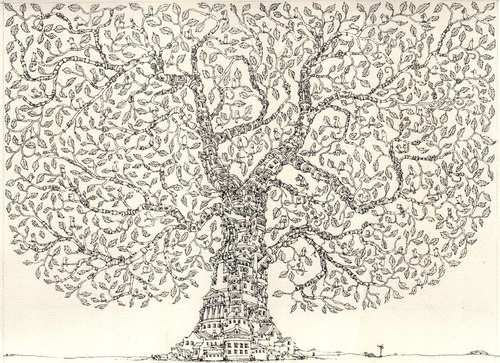(via)
It is not professional to burn a 300-page book manuscript because it no longer “speaks to you.” Nor is it befitting the product of a very good graduate education to eschew the academy altogether in favor of small magazines. Perhaps it is bizarre to study any academic topic for “some guidance about the conduct of public and private life.”
At the Third Annual Intellectual History Conference, held this October at the CUNY Graduate Center in New York, we heard six scholars wrangle with their field’s existential question: “Intellectual History for What?” And their answers spoke of a discipline that has never been wholly at home in the academy, and that is bound up with questions of personal import in the manner of Daniel Bell’s intellectual, one who “begins with his experience, his individual perceptions of the world, his privileges and deprivations, and judges the world by these sensibilities.”
We were inspired by these scholars’ approaches to the world of ideas, from within the academy’s walls, honeycombed with professional micro-niches, and from without, wherever friendly ports can be found. We were honored with a mention as one of those ports, by Casey Nelson Blake:
Meanwhile, a good many blogs operating on the margins of the academy, or well beyond its orbit, are rising to a challenge that most intellectual historians have yet to acknowledge. The editors of one such blog, The New Inquiry, write:
“The growing supply of career academics has flooded the university job market, and 21st century technologies have thrown traditional media into crisis. Although the future of higher education and print remains obscure, these cultural sea changes have yielded one definite side effect: an abundance of young writers and thinkers resolved to pursue a public intellectual life for its own sake—a pursuit ordered and enabled by Internet technology. “
The people writing in such venues are searching for alternative ways of living a life committed to ideas, even as the economic infrastructure for such a life crumbles beneath them. They are also, I’m delighted to see, seeking out writings that almost disappeared from humanities curricula during the last two or three decades. Those drawn to Addams, Croly, Bourne, Trilling, Ellison, or Sontag don’t want to “complicate the narrative”; they want to enter the moral narrative of their own country and master it. Nor do they seem to spend much time fretting about methodology: “method-ism” is in many respects what the research university does best, and its pulse is fading as fast as that of the university itself. Something is happening here, and we don’t know what it is, but any honest person knows what it isn’t: the Berkeley of 1960, the Columbia of 1950, the Madison of 1920, and the Ann Arbor of 1900 are not coming back. Given that reality, I have to ask if the research university really is the best place to address the question of ‘intellectual history for what?’
You can find all six papers uploaded here.
